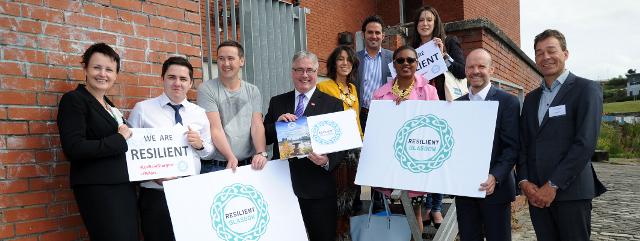- Glasgow City Council
- > News Archive
- > News Archive 2016
- > September 2016
- > Glasgow places people and communities at heart of resilience strategy
Glasgow places people and communities at heart of resilience strategy
People and communities have been placed at the heart of a new strategy intended to build Glasgow's resilience against the impact of the shocks and stresses faced by a city in the 21st century.
Produced as part of Glasgow's partnership with 100 Resilient Cities' project - pioneered by the Rockefeller Foundation - the "Resilient Glasgow" Strategy details almost 50 different actions intended to create a stronger and more adaptable city for all our future citizens.
Based on a lengthy and detailed conversation with 3500 Glasgow-residents, the strategy is the first of its kind to be released in the UK. The strategy examines how individuals, communities, businesses and institutions can continue to thrive and flourish despite the challenges created by life in a modern, urban setting.
Empowerment, unlocking placed-based solutions, economic growth and fostering civic participation provide the basic themes or pillars of the strategy. From these pillars fourteen goals have been set which will see Glasgow focused on key issues such as economic growth, tackling inequality, enhancing partnerships at all levels, delivering services around the needs of citizens and building capacity for resilience among the city's population.
The strategy was launched on Thursday 1 September by Councillor Frank McAveety, Leader of Glasgow City Council at the Whisky Bond next to Spiers Wharf on the Forth and Clyde Canal.
A warehouse formerly derelict and earmarked for demolition, the Whisky Bond has undergone a remarkable transformation since being refurbished in 2012 and is now home to over 60 small businesses, mainly in the cultural and creative industries. As part of wider regeneration efforts in the north Glasgow area, the Whisky Bond is seen as an excellent example of how to unlock potential and build the city's economic resilience.
Councillor McAveety said: "I am very proud to present Glasgow's first resilience strategy, which first of its kind in the UK. By its very nature Glasgow is a resilient city, but there is always the impetus to push harder and do much more.
"As a city we have dealt with so much change throughout our history. Yet we always step forward to grasp the next challenge and again look to the future. To do build and renew now we must first tackle inequalities and ensure the least well off are fully involved in the future life of our city.
"The resilience in our city comes from the people and it grows within our communities. Although an impressive piece of work, the strategy document is a staging post in the conversation between Glasgow's citizens and its institutions about resilience. The strategy points to the route ahead and I've no doubt the journey will be accompanied by robust debate - Glasgow wouldn't have it any other way.
"This on-going dialogue will strengthen our resilience and allow us to face the future with confidence."
Speakers
At the release of the Resilient Glasgow Strategy, Councillor McAveety was joined by a range of speakers, including:
- Community members who have shown resilience to overcome their own personal challenges or worked with others to support and inspire them.
- Lolita Jackson, Deputy Head of Resilience at City Hall, New York.
- Konstantina Karydi, Associate Director, Europe and the Middle East for 100 Resilient Cities.
Michael Berkowitz, President of 100 Resilient Cities, said: "Glasgow's rich history, architecture and culture are a testament to its resilience. This strategy is the result of extensive stakeholder engagement, research and self-assessment.
"100 Resilient Cities is honoured to partner with the great city of Glasgow and is committed to carrying out the vision laid out in this strategy in the coming years."
Lolita Jackson, Special Advisor to the New York City's Chief Resilience Officer, said: "As a member of Rockefeller Foundation's 100 Resilient Cities network, New York City is proud to stand alongside Glasgow at the vanguard of a new global movement that is changing the way cities respond to climate change and other 21st century threats."
Background Information
The full 'Resilient Glasgow' strategy plus summary can be found here
100 Resilient Cities is a global network of cities, supported by the Rockefeller Foundation, which is committed to meeting the social, physical and economic challenges of the 21stcentury. Glasgow was one of the first cities to join the network in December 2013.
Opened in 1790, the Forth and Clyde Canal was originally a vital transport connection during the early stages of the Industrial Revolution. It is now a focus of regeneration through the construction of social housing, leisure, business development and the use of formerly derelict spaces for cultural and artistic enterprises, such as the forthcoming opening of the new National Youth Theatre of Scotland facility at Spiers Wharf.
Over the next six years, the Glasgow City Region City Deal will see £266m invested in transforming Speirs Lock/Port Dundas, Cowlairs and Sighthill areas, all of which neighbour the Whisky Bond and canal area. This investment will go towards projects such as remediation of former heavy industrial sites, housing, transport connections, pedestrian access to the city centre and cycling infrastructure
Links & Further information
Further information on the Whisky Bond can be found here
Further information on Forth and Clyde Canal can be found here






